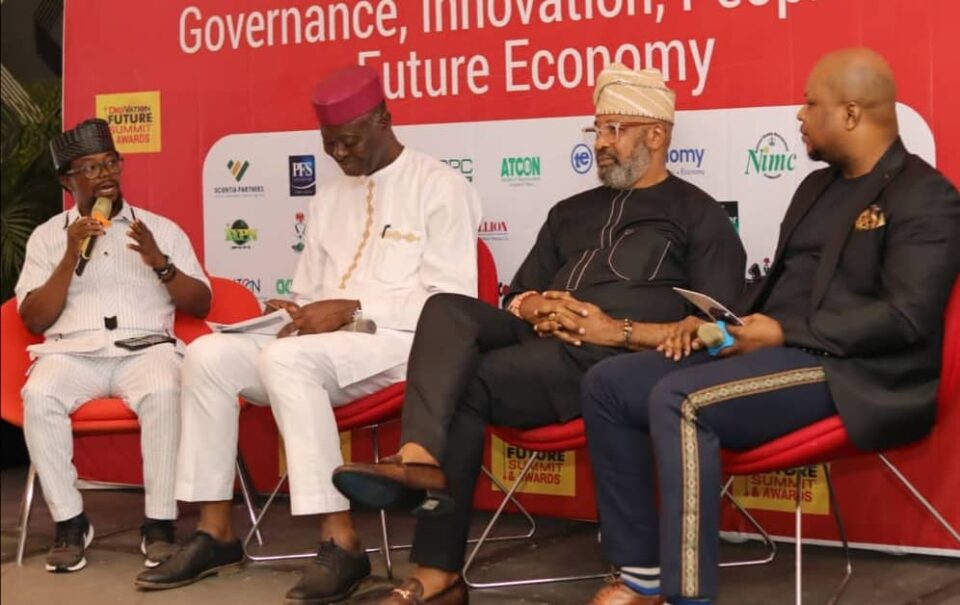By Cyriacus Nnaji
Sub-Saharan Africa is said to face critical challenges for digital development, including underdeveloped digital infrastructure, lack of assessable and affordable connectivity, a stubborn digital gender gap, limited skills for digitally enabled industries and adequate regulatory and policy environment.
Above were the words of Bayero Agabi, the Chief Host and Convener of DigiVation Future Summit, Africa’s Premier gathering of futurists which took place at Radisson Blu Hotel, Ikeja on the 22th of August, 2024.
According to Bayero Agabi, part of the reason for the gathering was to find solutions to the myriad of challenges bedeviling the digital development in Sub Sahara Africa.
He disclosed that DigiVation Future Summit is a multi-sectorial event bringing together people from diverse backgrounds to discuss issues reshaping today and future economies. Speakers were drawn from political, governance, business and technology space. DFS according to him, is West Africa’s most influential business, governance and technology event where new road maps are discussed, pathways chatted. “DigiVation Future Summit (DFS) provides a ground for breakthrough technologies and ideas where enterprise and solution based innovations are unveiled. It’s a platform for Africa’s biggest brands to do business and meet new partners, sharpen innovation skills and knowledge. It is a gathering of ideas, leaders and innovators for a better and greater future. In summary it’s a platform to examine our tomorrow and ways of making it better for all today.
“It’s a platform that brings together Africa thought-leaders in academia, technology, media content creators ICT, MDAs, policy makers, and the political class, to discuss how the Niger delta region can benefit and engage the unfolding future. The summit is a high-level event bringing top leaders with forward thinking high level impact developmental mind together to forge a new international consensus on how we deliver a better present and safeguard the future,” he stated.
In his contribution, Bayero Agabi, while calling on the discussants to deliberate elaborately on issue of social media, urged the nation’s regulatory authorities to monitor and regulate social media usage in the country. “I like to draw attention to what I called social media influence on Africa and whether it should be moderated or regulated. So far we have all seen the impact and effects of social media becoming a platform for Africa to demystify its dark continent narrative, empowering thousands through its economics, creating jobs for many and opening many to the world.
“On the negative side, social media has proven to be the best time-wasting platform creating anti-social generation and negatively influencing African culture. Check on your social media space today you will find nudity as culture than education and skills development. On this I will state that it’s time for Nigeria to moderate her social media space. If this is not done give it a short time the social media space will regulate our lives.”
Mr Tim Akano, MD/CEO, New Horison, in his contribution, spoke on Leveraging Policy and Governance to Accelerate Innovation for a Sustainable Future. He called for provision of internet in schools, saying that Access to free internet in schools is vital for building digital literacy which is a cornerstone of innovation. “By providing students with early exposure to digital tools and resources, we equip them with the skills needed to thrive in a tech-driven economy. Drawing from the Singaporean model, Nigeria can create an environment where students are empowered to explore, create, and innovate from a young age, helping to bridge the digital divide and prepare the next generation of innovators.
On Curriculum Reform he stated that the current educational curriculum in Nigeria is heavily theory-based, often disconnected from real-world applications. “Reforming the curriculum to emphasize practical, problem-solving skills is essential. Education should focus on equipping students with the tools to address Nigeria’s immediate challenges, whether in agriculture, health, or technology. This includes integrating subjects like coding, entrepreneurship, and design thinking, making education more relevant and directly applicable to the country’s development needs.
Akano disclosed that nurturing a thriving innovation ecosystem is crucial. “It’s crucial to have a dedicated department focused on promoting and marketing innovative ideas. This department would act as a bridge between innovators and potential investors, helping to bring ideas to market. It could also provide guidance on intellectual property rights and connect innovators with global markets, ensuring that Nigerian innovations can compete on the world stage. E.g. Israel has a department that market products globally.”
He said that Startups are the lifeblood of innovation, but added that they often struggle due to lack of support. He stated that Policies should be introduced to provide startups with access to funding, mentorship, and resources. This could include government-backed venture funds, tax incentives for investors, and incubator programs that offer startups the necessary infrastructure and networking opportunities to scale their businesses.
On Job Security and Economic Models (Dubai Model), he said, “The Dubai model, known for its focus on job security and economic diversification, can offer valuable lessons for Nigeria. By adopting similar policies, Nigeria can create a more stable economic environment that encourages innovation. This includes implementing labor laws that protect workers while also promoting entrepreneurship, thereby attracting both local and foreign investments.”
Akano disclosed that to stimulate innovation, Nigeria should consider offering tax incentives or grants to businesses that invest in research and development or create innovative products and services. These incentives would not only encourage existing businesses to innovate but also attract new ventures that contribute to the country’s economic growth.
He said that while internet access is essential, it’s important to manage its use among minors to ensure it contributes positively to their development. Regulated access, such as limiting usage to three hours a day for those under 18 can help balance the benefits of digital learning with the need to protect children from potential online risks. This approach promotes responsible digital citizenship from a young age, encouraging productive and
He also spoke on Cross-Sector Collaboration; Regulatory Frameworks, wherein he said that the pace of technological change requires adaptable regulatory frameworks that can keep up with new innovations without stifling them. Nigeria, he said, needs to develop regulations that are flexible, allowing for the rapid adoption of new technologies while safeguarding public interest. This includes creating a regulatory environment that supports emerging sectors like fintech, agritech, and renewable energy.
On Tech Hubs and Innovation Centers, he said “To foster innovation, it’s important to develop tech hubs and innovation centers where entrepreneurs, researchers, and students can collaborate and experiment. These hubs would serve as incubators for new ideas, providing the infrastructure and resources necessary for innovation to thrive. They would also facilitate partnerships between academia, industry, and government, creating a vibrant ecosystem of innovation.”
Akano added that robust digital infrastructure is the backbone of a modern economy. Nigeria must invest in building and expanding digital infrastructure such as high-speed internet, data centers, and mobile networks to support the growth of tech-driven innovations. This infrastructure will not only enhance connectivity but also enable new business models and services that can drive economic growth.
The paper, ‘Preserving Cultural Identity in the Digital Age: Navigating Globalization and Technology in Nigeria’ was delivered by Otunba Biodun Ajiboye, Executive Secretary/CEO, National Institute for Cultural Orientation (NICO). He said that in an era where digital technology and globalization are reshaping societies around the globe, Nigeria finds itself at a critical crossroads. According to him, the question that looms large is whether globalization, driven by digital technology, is undermining the nation’s cultural heritage by encouraging the adoption of foreign cultures that may not align with its values.
He said “The transformation of our value systems and languages in Nigeria has been significantly influenced by globalization, a process that began with British colonialism. Unlike countries such as India, which resisted the imposition of foreign cultures and celebrated their own, many Nigerian societies under British rule gradually erased their cultural identities, embracing foreign ones that are difficult to reconcile with our authentic cultural heritage.
“Our legal system, for instance, is a reflection of this colonial legacy. The laws we abide by are rooted in British norms, not reflective of our indigenous cultures. This has resulted in a diminished focus on our cultural heritage, as we are guided by foreign laws that impact our cultural and socio-economic evolution.”
Otunba Biodun Ajiboye stated that this complex history has also shaped the nation’s entry into the digital age. Without a clear template to leverage digital technology for development, the nation faces the challenge of creating local content that serves diverse population of over 220 million people, rich in culture and languages.
“We must ask ourselves: How did countries like China and India and even Japan, who were also colonized or conquered, manage to lead the technological revolution without losing their cultural identities? The answer lies in their ability to resist cultural imperialism and integrate technology with their cultural values.
“In Nigeria, we are at the mercy of globalization’s forces, but we must recognize that culture is dynamic. While globalization will continue to influence our cultural structures, we must resist the temptation to discard our cultural values. We need to engage with globalization and the digital economy as opportunities to reprioritize and revitalize our cultural heritage.
“At NICO, our mission includes exploring the connections between culture and technology. We are committed to developing technological content within the context of our diverse cultures, paving the way for socio-economic growth across sectors.”
He added that embracing globalization and digital technology does not mean abandoning the cultural values. On the contrary, it means reworking the nation’s engagement with globalization and using technology to advance the cultural heritage.”
In conclusion he said, “The relevance of digital technology in promoting our cultures and building legacy institutions for future generations cannot be overstated. By finding the nexus between digital innovation and our rich cultural heritage, we can accelerate our collective prosperity and contribute to the global cultural and digital landscape.”



